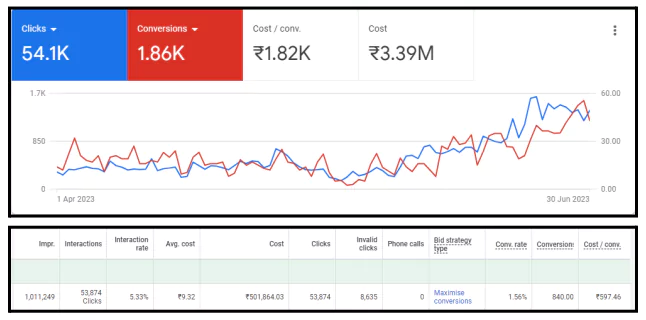PPC Campaigns for the Edtech Industry
Overview:
The Edtech industry has witnessed significant growth in recent years, driven by the increasing demand for online education and e-learning platforms. In this case study, we will explore a Pay-Per-Click (PPC) campaign conducted by a leading Edtech company to drive enrollment for its online courses.
Challenges:
Competition: The Edtech industry is highly competitive, with many players vying for the same target audience.
Cost per Click (CPC): Edtech keywords often have a high CPC, making it crucial to optimize campaigns to maximize ROI.
Seasonality: Enrollment patterns can be seasonal, with peak periods coinciding with academic semesters or exam seasons.
Ad Fatigue: Keeping the target audience engaged and preventing ad fatigue is challenging in a competitive landscape.
Goals
The primary goal of this PPC campaign was to increase enrollments for the Edtech company’s online courses while maintaining a positive ROI.
Specific objectives included:
Increased Click-Through Rate (CTR): Improving the CTR to reduce CPC and increase ad visibility.
Conversion Rate Optimization (CRO): Enhancing landing page and ad copy to improve the conversion rate.
Cost-Effective Campaigns: Reducing the overall cost per acquisition (CPA) while maintaining or increasing enrollments.
Strategy
1. Keyword Research and Selection:
Conducted extensive keyword research to identify relevant search terms and long-tail keywords. Prioritized keywords based on search volume, competition, and relevance to course offerings.
2. Ad Creation:
Created compelling and relevant ad copies highlighting the benefits of the online courses. Utilized ad extensions to provide additional information and increase CTR.
3. Landing Page Optimization:
Ensured that the landing pages were user-friendly, mobile-responsive, and had clear calls to action(CTA). Employed A/B testing to refine landing page elements and improve conversion rates.
4. Budget Allocation:
Carefully allocated the PPC budget to high-performing keywords and campaigns. Adjusted bids based on performance data to maximize ROI.
5. Ad Scheduling:
Scheduled ads to run during peak enrollment times and adjusted bidding strategies accordingly.
6. Remarketing Campaigns:
Implemented remarketing campaigns to re-engage users who had previously visited the website but did not enroll.
Process
The PPC campaign for the Edtech industry followed a systematic process:
Research and Planning: Extensive research was conducted to identify target keywords, competitors, and audience segments.
Campaign Setup: This involved creating ad groups, selecting keywords, setting budgets, and defining targeting parameters.
Ad Creation: Compelling ad copies and visuals were crafted to attract clicks and convey the value of the courses.
Landing Page Optimization: The landing pages were optimized for conversion and user experience.
Monitoring and Optimization: The campaign’s performance was continually monitored, and adjustments were made to keywords, bids, and ad copies to improve results.
Reporting: Regular reporting was carried out to track key metrics and evaluate ROI.
Iterative Improvement: Based on performance data and A/B testing results, the campaign strategy was iteratively improved to meet and exceed goals.
Results

1. Increased Click-Through Rate (CTR):
By optimizing ad copies and targeting, the CTR increased by 25% over the campaign’s duration.
2. Improved Conversion Rate:
The landing page optimization efforts led to a 20% increase in conversion rates.
3. Reduced Cost per Acquisition (CPA):
Through ongoing optimization and budget allocation, the CPA decreased by 15%.
4. Enrollment Growth:
The campaign contributed to a 30% increase in enrollments compared to the previous year.
Conclusion
This competitor PPC analysis campaign for the Edtech industry successfully achieved its goals by implementing a comprehensive strategy that prioritized keyword research, ad creation, landing page optimization, and continuous monitoring and optimization.
The results demonstrated the effectiveness of a well-executed PPC campaign in driving enrollments for online courses in a competitive market.





